Criminology Report on Policing in Democratic Society and Violence
VerifiedAdded on 2023/06/11
|11
|2429
|331
Report
AI Summary
This criminology report examines the role of policing in democratic societies, contrasting it with non-democratic systems and emphasizing the importance of respecting human dignity and adhering to the rule of law. It discusses the Canadian Charter of Rights and Freedoms and its impact on policing, particularly concerning unreasonable arrest and the presumption of innocence. The report also delves into the pluralist theory and its connection to democratic policing, highlighting the protection of individual rights. Further, it addresses the role of police in combating domestic violence, referencing the Protection against Family Violence Act and other relevant legislation. The report acknowledges the limitations in policing domestic violence, such as victims withdrawing complaints due to family pressure. The report concludes by asserting the significance of police in ensuring public safety and order within a democratic framework, while upholding the rights and freedoms of citizens and students can find similar documents and study resources on Desklib.
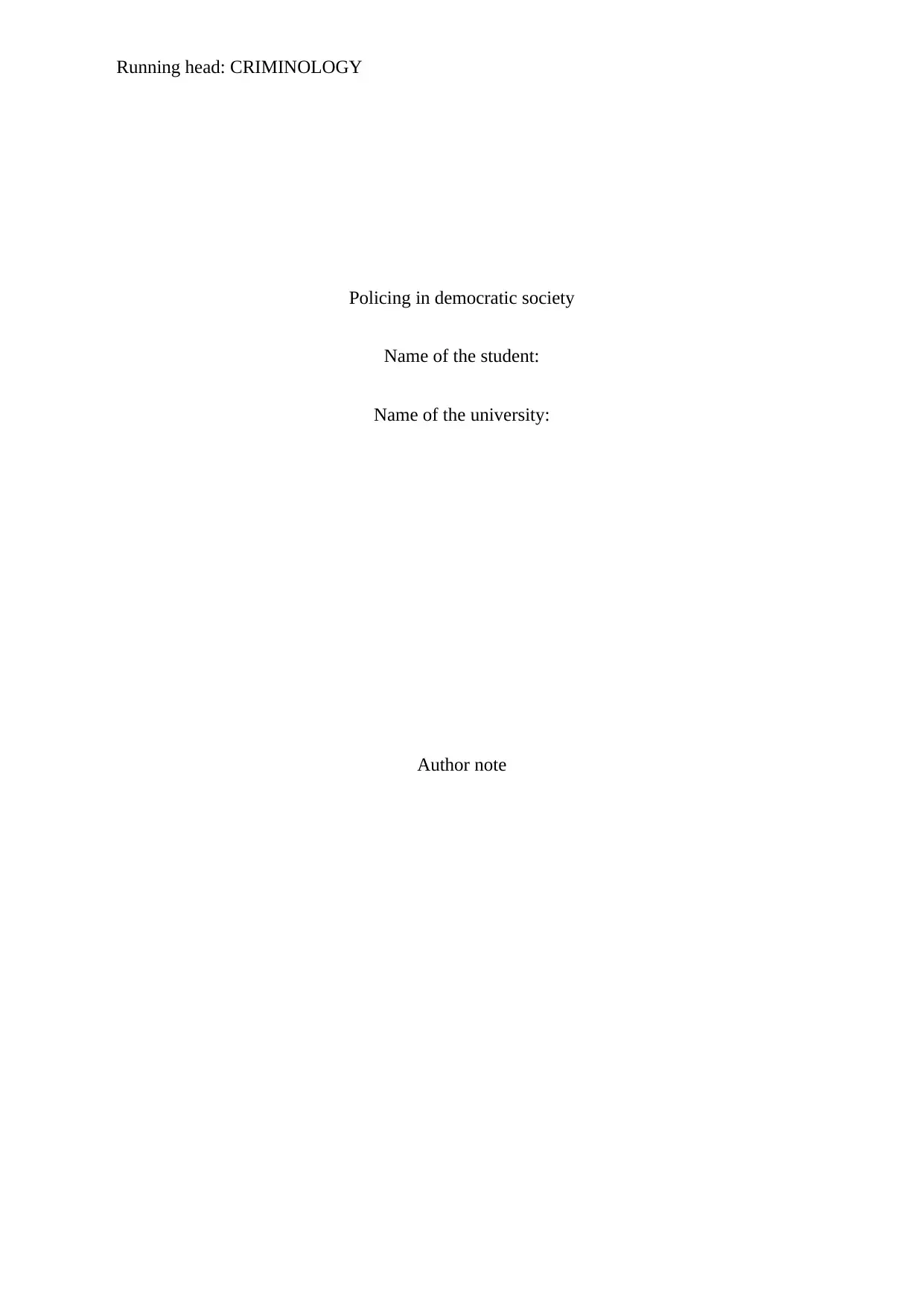
Running head: CRIMINOLOGY
Policing in democratic society
Name of the student:
Name of the university:
Author note
Policing in democratic society
Name of the student:
Name of the university:
Author note
Paraphrase This Document
Need a fresh take? Get an instant paraphrase of this document with our AI Paraphraser
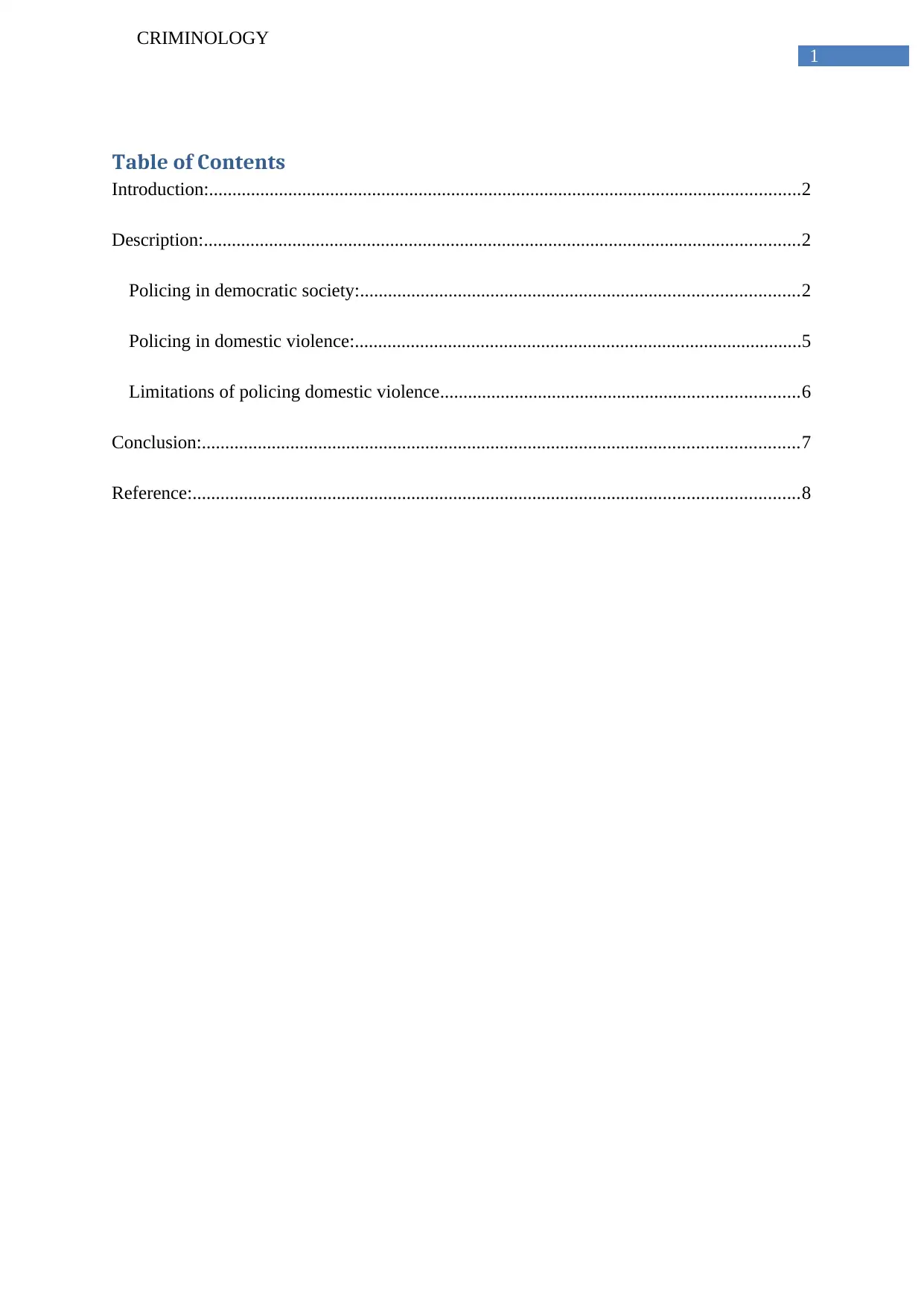
1
CRIMINOLOGY
Table of Contents
Introduction:...............................................................................................................................2
Description:................................................................................................................................2
Policing in democratic society:..............................................................................................2
Policing in domestic violence:................................................................................................5
Limitations of policing domestic violence.............................................................................6
Conclusion:................................................................................................................................7
Reference:..................................................................................................................................8
CRIMINOLOGY
Table of Contents
Introduction:...............................................................................................................................2
Description:................................................................................................................................2
Policing in democratic society:..............................................................................................2
Policing in domestic violence:................................................................................................5
Limitations of policing domestic violence.............................................................................6
Conclusion:................................................................................................................................7
Reference:..................................................................................................................................8
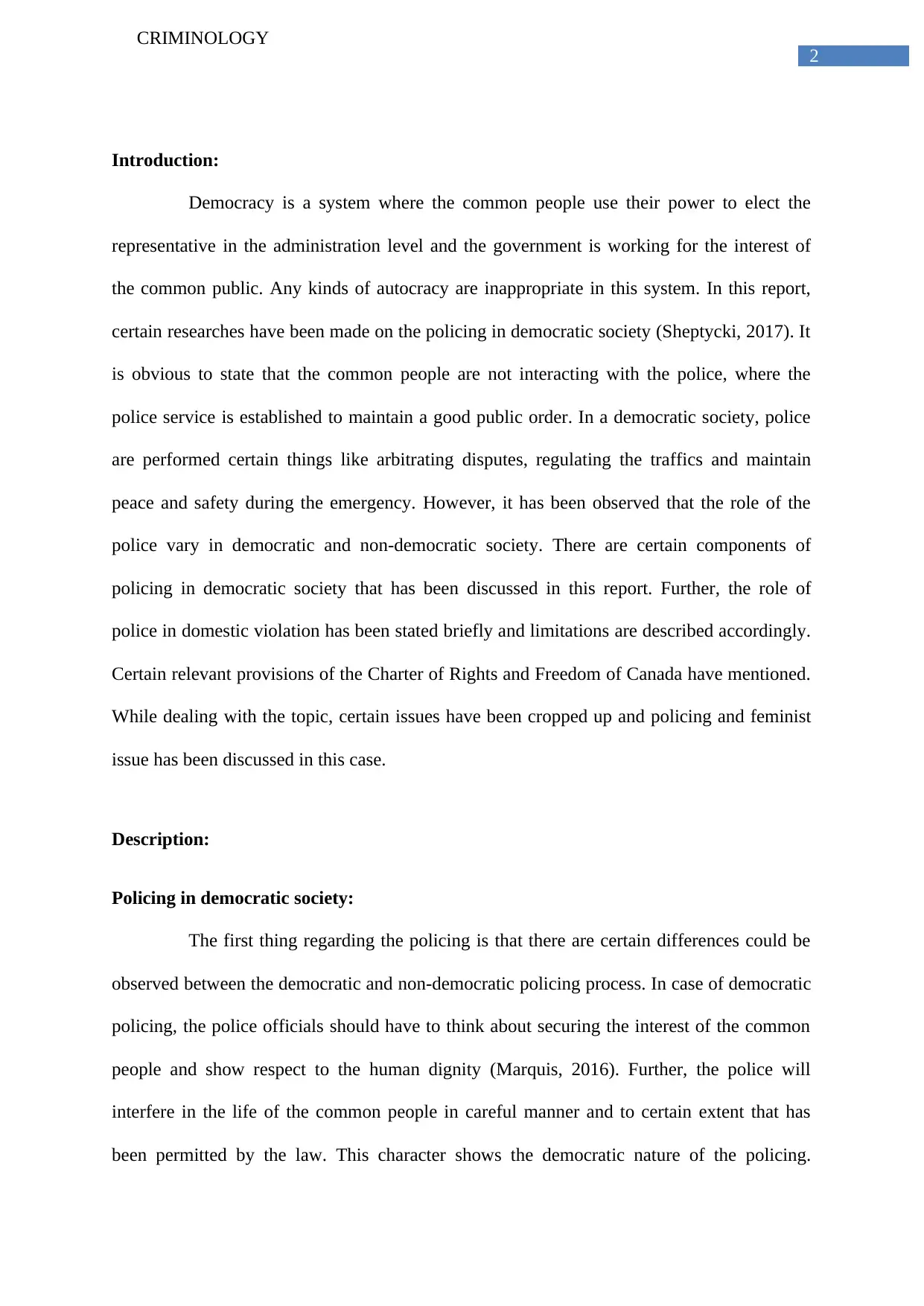
2
CRIMINOLOGY
Introduction:
Democracy is a system where the common people use their power to elect the
representative in the administration level and the government is working for the interest of
the common public. Any kinds of autocracy are inappropriate in this system. In this report,
certain researches have been made on the policing in democratic society (Sheptycki, 2017). It
is obvious to state that the common people are not interacting with the police, where the
police service is established to maintain a good public order. In a democratic society, police
are performed certain things like arbitrating disputes, regulating the traffics and maintain
peace and safety during the emergency. However, it has been observed that the role of the
police vary in democratic and non-democratic society. There are certain components of
policing in democratic society that has been discussed in this report. Further, the role of
police in domestic violation has been stated briefly and limitations are described accordingly.
Certain relevant provisions of the Charter of Rights and Freedom of Canada have mentioned.
While dealing with the topic, certain issues have been cropped up and policing and feminist
issue has been discussed in this case.
Description:
Policing in democratic society:
The first thing regarding the policing is that there are certain differences could be
observed between the democratic and non-democratic policing process. In case of democratic
policing, the police officials should have to think about securing the interest of the common
people and show respect to the human dignity (Marquis, 2016). Further, the police will
interfere in the life of the common people in careful manner and to certain extent that has
been permitted by the law. This character shows the democratic nature of the policing.
CRIMINOLOGY
Introduction:
Democracy is a system where the common people use their power to elect the
representative in the administration level and the government is working for the interest of
the common public. Any kinds of autocracy are inappropriate in this system. In this report,
certain researches have been made on the policing in democratic society (Sheptycki, 2017). It
is obvious to state that the common people are not interacting with the police, where the
police service is established to maintain a good public order. In a democratic society, police
are performed certain things like arbitrating disputes, regulating the traffics and maintain
peace and safety during the emergency. However, it has been observed that the role of the
police vary in democratic and non-democratic society. There are certain components of
policing in democratic society that has been discussed in this report. Further, the role of
police in domestic violation has been stated briefly and limitations are described accordingly.
Certain relevant provisions of the Charter of Rights and Freedom of Canada have mentioned.
While dealing with the topic, certain issues have been cropped up and policing and feminist
issue has been discussed in this case.
Description:
Policing in democratic society:
The first thing regarding the policing is that there are certain differences could be
observed between the democratic and non-democratic policing process. In case of democratic
policing, the police officials should have to think about securing the interest of the common
people and show respect to the human dignity (Marquis, 2016). Further, the police will
interfere in the life of the common people in careful manner and to certain extent that has
been permitted by the law. This character shows the democratic nature of the policing.
⊘ This is a preview!⊘
Do you want full access?
Subscribe today to unlock all pages.

Trusted by 1+ million students worldwide
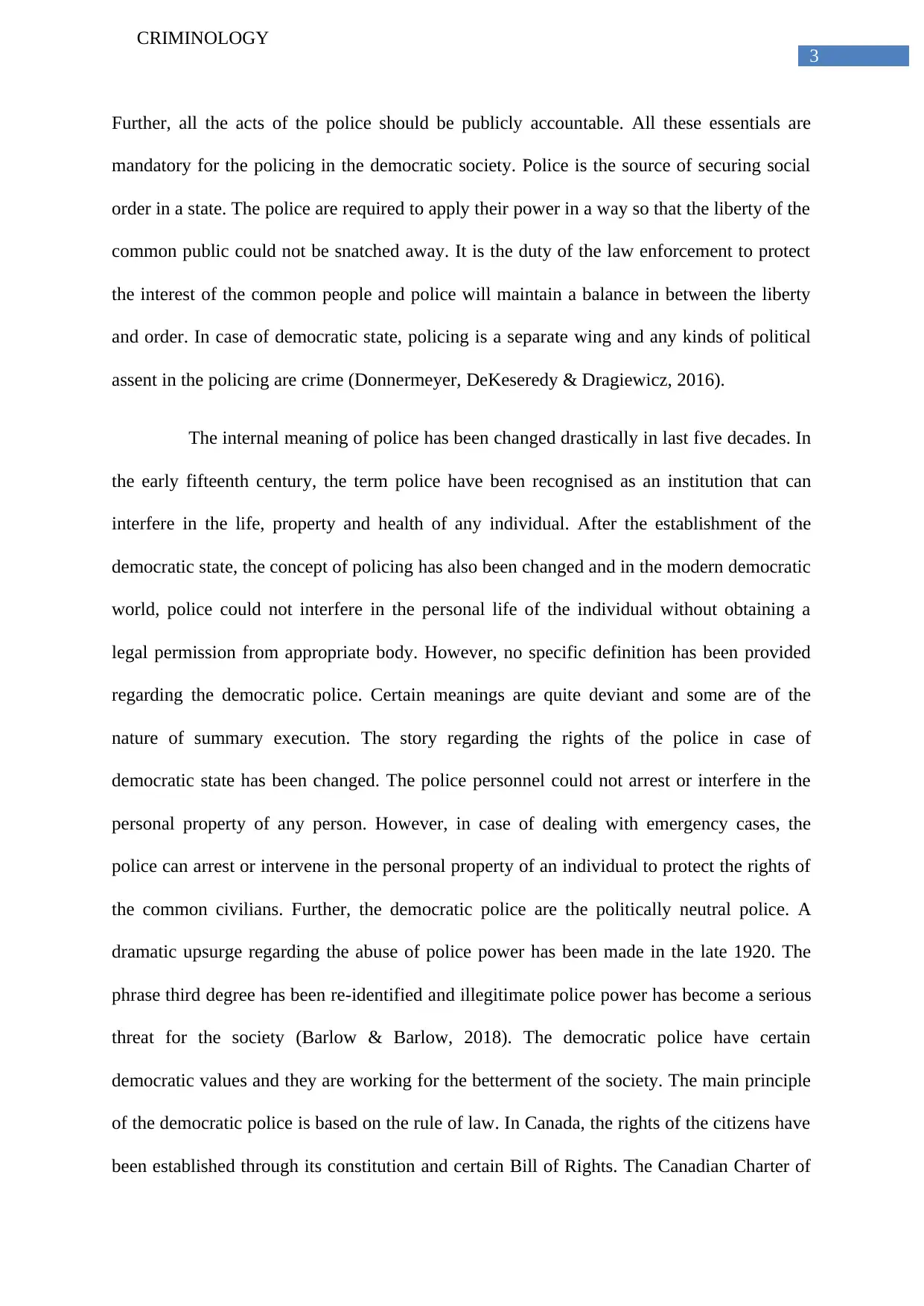
3
CRIMINOLOGY
Further, all the acts of the police should be publicly accountable. All these essentials are
mandatory for the policing in the democratic society. Police is the source of securing social
order in a state. The police are required to apply their power in a way so that the liberty of the
common public could not be snatched away. It is the duty of the law enforcement to protect
the interest of the common people and police will maintain a balance in between the liberty
and order. In case of democratic state, policing is a separate wing and any kinds of political
assent in the policing are crime (Donnermeyer, DeKeseredy & Dragiewicz, 2016).
The internal meaning of police has been changed drastically in last five decades. In
the early fifteenth century, the term police have been recognised as an institution that can
interfere in the life, property and health of any individual. After the establishment of the
democratic state, the concept of policing has also been changed and in the modern democratic
world, police could not interfere in the personal life of the individual without obtaining a
legal permission from appropriate body. However, no specific definition has been provided
regarding the democratic police. Certain meanings are quite deviant and some are of the
nature of summary execution. The story regarding the rights of the police in case of
democratic state has been changed. The police personnel could not arrest or interfere in the
personal property of any person. However, in case of dealing with emergency cases, the
police can arrest or intervene in the personal property of an individual to protect the rights of
the common civilians. Further, the democratic police are the politically neutral police. A
dramatic upsurge regarding the abuse of police power has been made in the late 1920. The
phrase third degree has been re-identified and illegitimate police power has become a serious
threat for the society (Barlow & Barlow, 2018). The democratic police have certain
democratic values and they are working for the betterment of the society. The main principle
of the democratic police is based on the rule of law. In Canada, the rights of the citizens have
been established through its constitution and certain Bill of Rights. The Canadian Charter of
CRIMINOLOGY
Further, all the acts of the police should be publicly accountable. All these essentials are
mandatory for the policing in the democratic society. Police is the source of securing social
order in a state. The police are required to apply their power in a way so that the liberty of the
common public could not be snatched away. It is the duty of the law enforcement to protect
the interest of the common people and police will maintain a balance in between the liberty
and order. In case of democratic state, policing is a separate wing and any kinds of political
assent in the policing are crime (Donnermeyer, DeKeseredy & Dragiewicz, 2016).
The internal meaning of police has been changed drastically in last five decades. In
the early fifteenth century, the term police have been recognised as an institution that can
interfere in the life, property and health of any individual. After the establishment of the
democratic state, the concept of policing has also been changed and in the modern democratic
world, police could not interfere in the personal life of the individual without obtaining a
legal permission from appropriate body. However, no specific definition has been provided
regarding the democratic police. Certain meanings are quite deviant and some are of the
nature of summary execution. The story regarding the rights of the police in case of
democratic state has been changed. The police personnel could not arrest or interfere in the
personal property of any person. However, in case of dealing with emergency cases, the
police can arrest or intervene in the personal property of an individual to protect the rights of
the common civilians. Further, the democratic police are the politically neutral police. A
dramatic upsurge regarding the abuse of police power has been made in the late 1920. The
phrase third degree has been re-identified and illegitimate police power has become a serious
threat for the society (Barlow & Barlow, 2018). The democratic police have certain
democratic values and they are working for the betterment of the society. The main principle
of the democratic police is based on the rule of law. In Canada, the rights of the citizens have
been established through its constitution and certain Bill of Rights. The Canadian Charter of
Paraphrase This Document
Need a fresh take? Get an instant paraphrase of this document with our AI Paraphraser
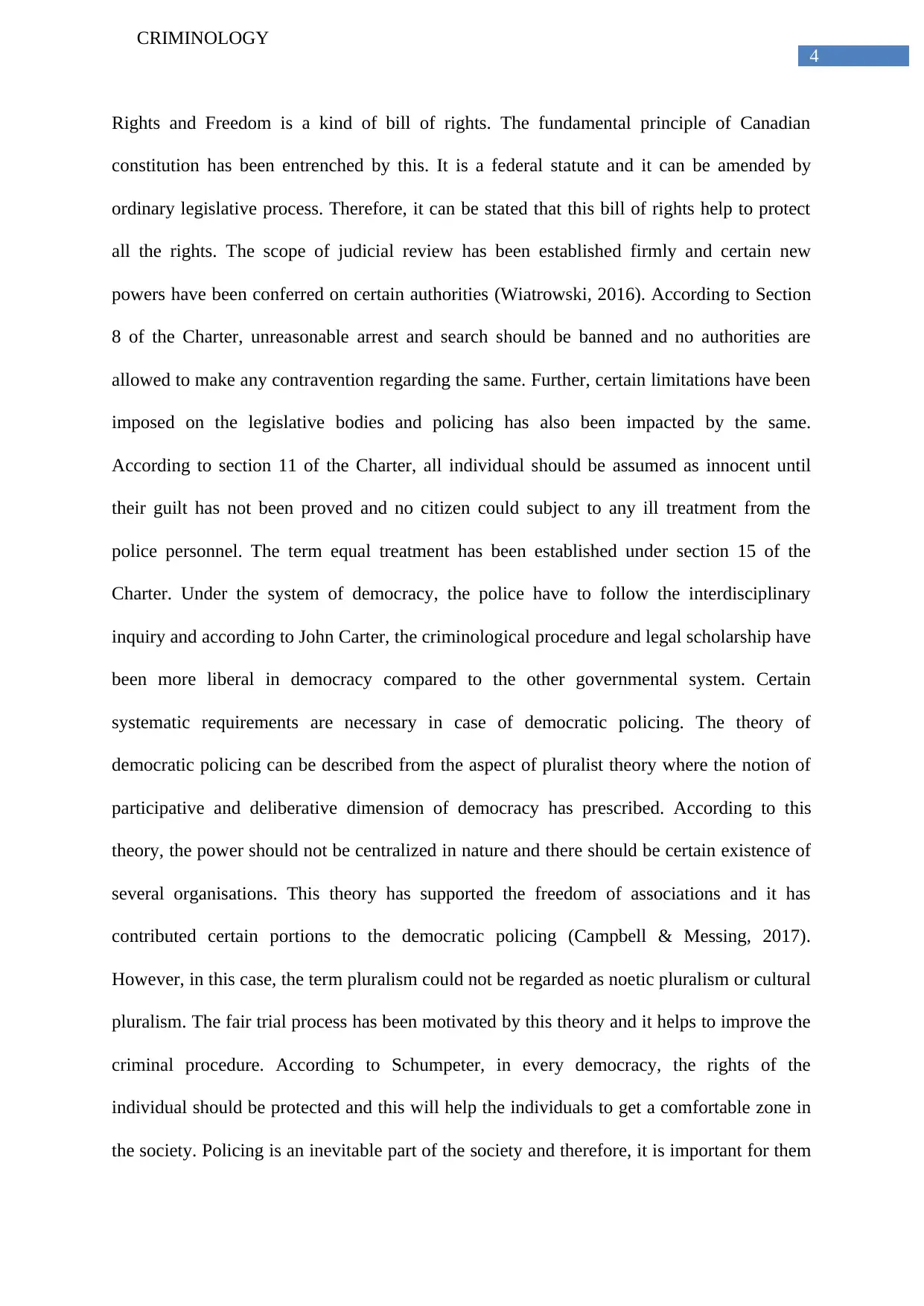
4
CRIMINOLOGY
Rights and Freedom is a kind of bill of rights. The fundamental principle of Canadian
constitution has been entrenched by this. It is a federal statute and it can be amended by
ordinary legislative process. Therefore, it can be stated that this bill of rights help to protect
all the rights. The scope of judicial review has been established firmly and certain new
powers have been conferred on certain authorities (Wiatrowski, 2016). According to Section
8 of the Charter, unreasonable arrest and search should be banned and no authorities are
allowed to make any contravention regarding the same. Further, certain limitations have been
imposed on the legislative bodies and policing has also been impacted by the same.
According to section 11 of the Charter, all individual should be assumed as innocent until
their guilt has not been proved and no citizen could subject to any ill treatment from the
police personnel. The term equal treatment has been established under section 15 of the
Charter. Under the system of democracy, the police have to follow the interdisciplinary
inquiry and according to John Carter, the criminological procedure and legal scholarship have
been more liberal in democracy compared to the other governmental system. Certain
systematic requirements are necessary in case of democratic policing. The theory of
democratic policing can be described from the aspect of pluralist theory where the notion of
participative and deliberative dimension of democracy has prescribed. According to this
theory, the power should not be centralized in nature and there should be certain existence of
several organisations. This theory has supported the freedom of associations and it has
contributed certain portions to the democratic policing (Campbell & Messing, 2017).
However, in this case, the term pluralism could not be regarded as noetic pluralism or cultural
pluralism. The fair trial process has been motivated by this theory and it helps to improve the
criminal procedure. According to Schumpeter, in every democracy, the rights of the
individual should be protected and this will help the individuals to get a comfortable zone in
the society. Policing is an inevitable part of the society and therefore, it is important for them
CRIMINOLOGY
Rights and Freedom is a kind of bill of rights. The fundamental principle of Canadian
constitution has been entrenched by this. It is a federal statute and it can be amended by
ordinary legislative process. Therefore, it can be stated that this bill of rights help to protect
all the rights. The scope of judicial review has been established firmly and certain new
powers have been conferred on certain authorities (Wiatrowski, 2016). According to Section
8 of the Charter, unreasonable arrest and search should be banned and no authorities are
allowed to make any contravention regarding the same. Further, certain limitations have been
imposed on the legislative bodies and policing has also been impacted by the same.
According to section 11 of the Charter, all individual should be assumed as innocent until
their guilt has not been proved and no citizen could subject to any ill treatment from the
police personnel. The term equal treatment has been established under section 15 of the
Charter. Under the system of democracy, the police have to follow the interdisciplinary
inquiry and according to John Carter, the criminological procedure and legal scholarship have
been more liberal in democracy compared to the other governmental system. Certain
systematic requirements are necessary in case of democratic policing. The theory of
democratic policing can be described from the aspect of pluralist theory where the notion of
participative and deliberative dimension of democracy has prescribed. According to this
theory, the power should not be centralized in nature and there should be certain existence of
several organisations. This theory has supported the freedom of associations and it has
contributed certain portions to the democratic policing (Campbell & Messing, 2017).
However, in this case, the term pluralism could not be regarded as noetic pluralism or cultural
pluralism. The fair trial process has been motivated by this theory and it helps to improve the
criminal procedure. According to Schumpeter, in every democracy, the rights of the
individual should be protected and this will help the individuals to get a comfortable zone in
the society. Policing is an inevitable part of the society and therefore, it is important for them
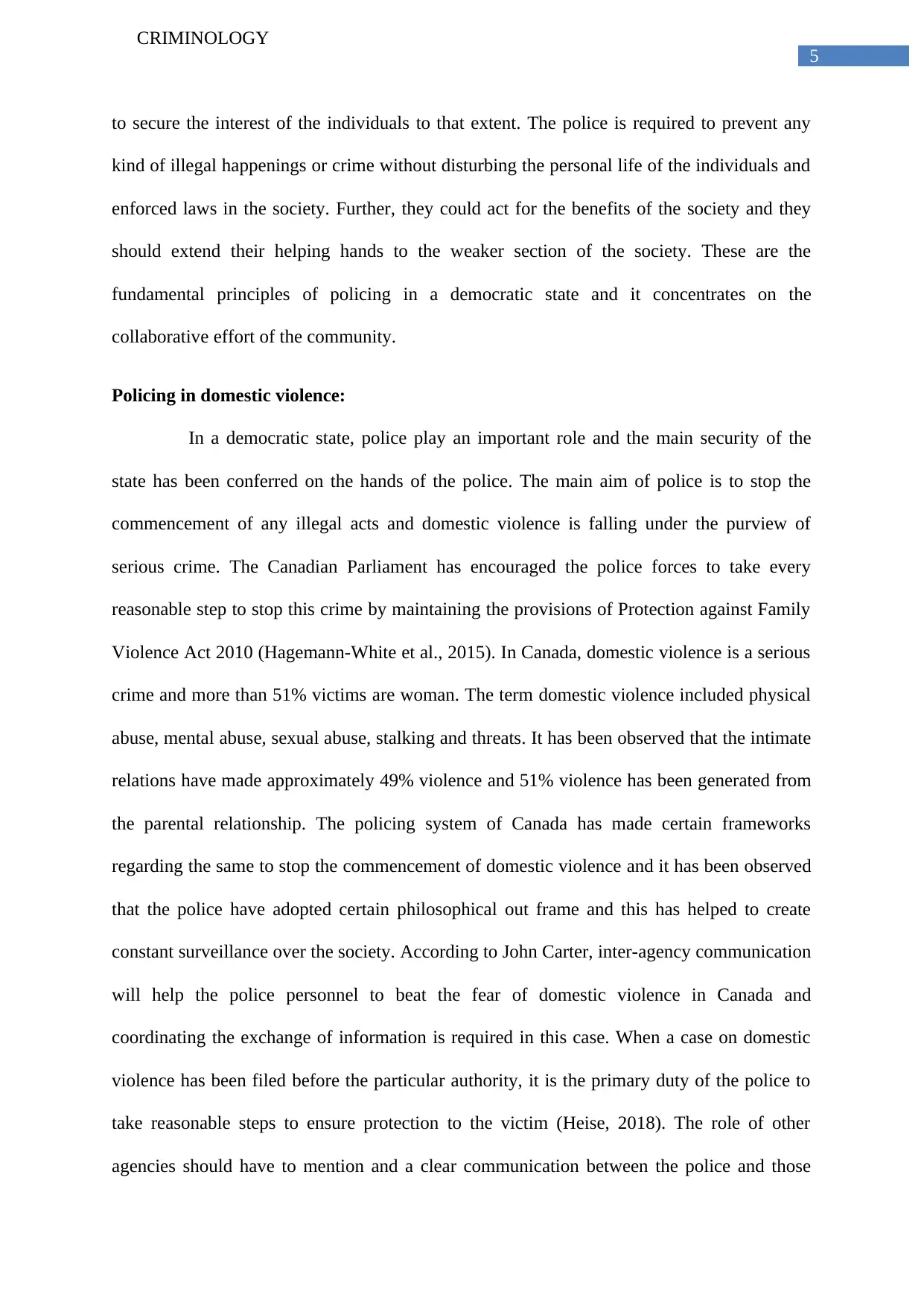
5
CRIMINOLOGY
to secure the interest of the individuals to that extent. The police is required to prevent any
kind of illegal happenings or crime without disturbing the personal life of the individuals and
enforced laws in the society. Further, they could act for the benefits of the society and they
should extend their helping hands to the weaker section of the society. These are the
fundamental principles of policing in a democratic state and it concentrates on the
collaborative effort of the community.
Policing in domestic violence:
In a democratic state, police play an important role and the main security of the
state has been conferred on the hands of the police. The main aim of police is to stop the
commencement of any illegal acts and domestic violence is falling under the purview of
serious crime. The Canadian Parliament has encouraged the police forces to take every
reasonable step to stop this crime by maintaining the provisions of Protection against Family
Violence Act 2010 (Hagemann-White et al., 2015). In Canada, domestic violence is a serious
crime and more than 51% victims are woman. The term domestic violence included physical
abuse, mental abuse, sexual abuse, stalking and threats. It has been observed that the intimate
relations have made approximately 49% violence and 51% violence has been generated from
the parental relationship. The policing system of Canada has made certain frameworks
regarding the same to stop the commencement of domestic violence and it has been observed
that the police have adopted certain philosophical out frame and this has helped to create
constant surveillance over the society. According to John Carter, inter-agency communication
will help the police personnel to beat the fear of domestic violence in Canada and
coordinating the exchange of information is required in this case. When a case on domestic
violence has been filed before the particular authority, it is the primary duty of the police to
take reasonable steps to ensure protection to the victim (Heise, 2018). The role of other
agencies should have to mention and a clear communication between the police and those
CRIMINOLOGY
to secure the interest of the individuals to that extent. The police is required to prevent any
kind of illegal happenings or crime without disturbing the personal life of the individuals and
enforced laws in the society. Further, they could act for the benefits of the society and they
should extend their helping hands to the weaker section of the society. These are the
fundamental principles of policing in a democratic state and it concentrates on the
collaborative effort of the community.
Policing in domestic violence:
In a democratic state, police play an important role and the main security of the
state has been conferred on the hands of the police. The main aim of police is to stop the
commencement of any illegal acts and domestic violence is falling under the purview of
serious crime. The Canadian Parliament has encouraged the police forces to take every
reasonable step to stop this crime by maintaining the provisions of Protection against Family
Violence Act 2010 (Hagemann-White et al., 2015). In Canada, domestic violence is a serious
crime and more than 51% victims are woman. The term domestic violence included physical
abuse, mental abuse, sexual abuse, stalking and threats. It has been observed that the intimate
relations have made approximately 49% violence and 51% violence has been generated from
the parental relationship. The policing system of Canada has made certain frameworks
regarding the same to stop the commencement of domestic violence and it has been observed
that the police have adopted certain philosophical out frame and this has helped to create
constant surveillance over the society. According to John Carter, inter-agency communication
will help the police personnel to beat the fear of domestic violence in Canada and
coordinating the exchange of information is required in this case. When a case on domestic
violence has been filed before the particular authority, it is the primary duty of the police to
take reasonable steps to ensure protection to the victim (Heise, 2018). The role of other
agencies should have to mention and a clear communication between the police and those
⊘ This is a preview!⊘
Do you want full access?
Subscribe today to unlock all pages.

Trusted by 1+ million students worldwide
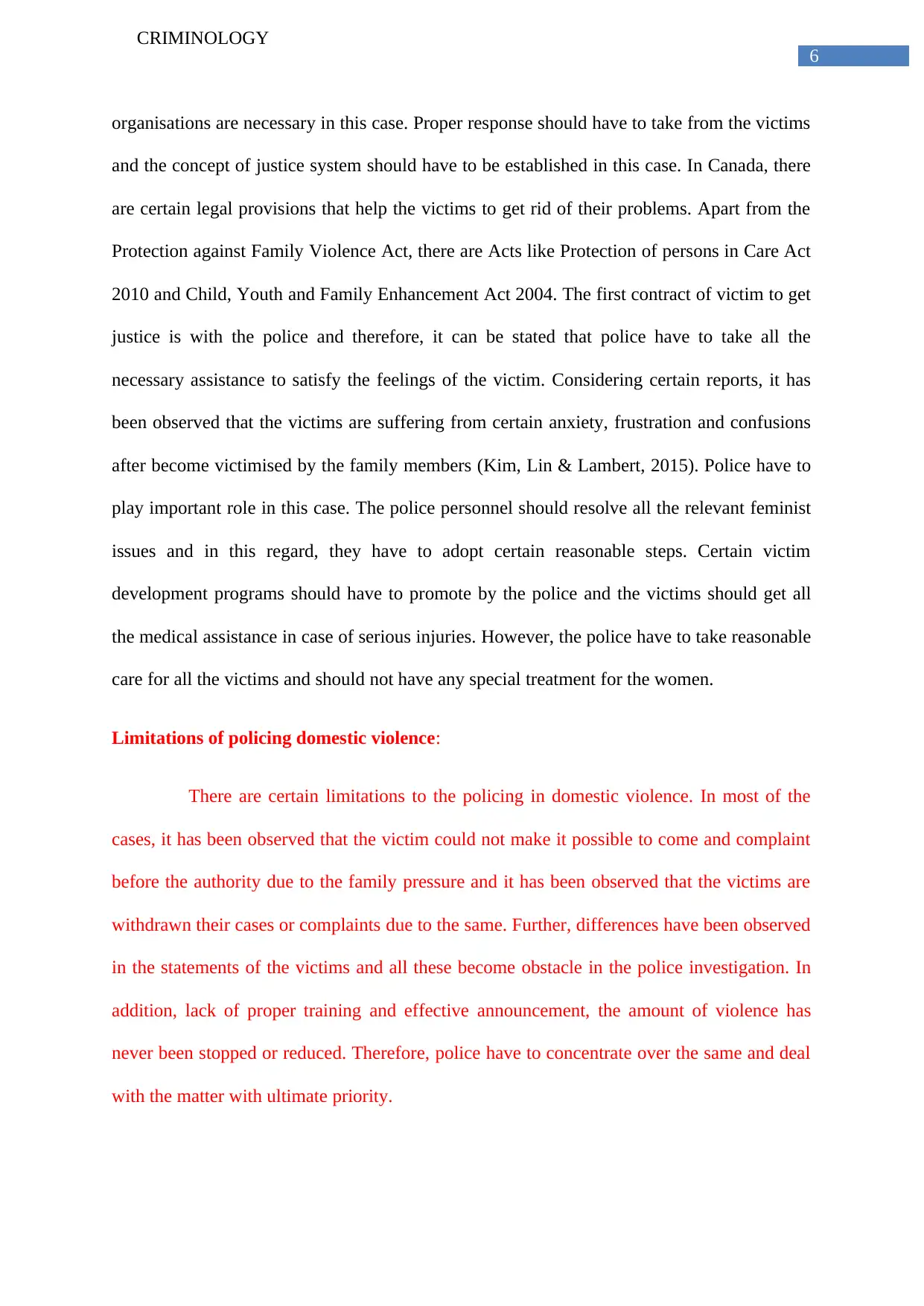
6
CRIMINOLOGY
organisations are necessary in this case. Proper response should have to take from the victims
and the concept of justice system should have to be established in this case. In Canada, there
are certain legal provisions that help the victims to get rid of their problems. Apart from the
Protection against Family Violence Act, there are Acts like Protection of persons in Care Act
2010 and Child, Youth and Family Enhancement Act 2004. The first contract of victim to get
justice is with the police and therefore, it can be stated that police have to take all the
necessary assistance to satisfy the feelings of the victim. Considering certain reports, it has
been observed that the victims are suffering from certain anxiety, frustration and confusions
after become victimised by the family members (Kim, Lin & Lambert, 2015). Police have to
play important role in this case. The police personnel should resolve all the relevant feminist
issues and in this regard, they have to adopt certain reasonable steps. Certain victim
development programs should have to promote by the police and the victims should get all
the medical assistance in case of serious injuries. However, the police have to take reasonable
care for all the victims and should not have any special treatment for the women.
Limitations of policing domestic violence:
There are certain limitations to the policing in domestic violence. In most of the
cases, it has been observed that the victim could not make it possible to come and complaint
before the authority due to the family pressure and it has been observed that the victims are
withdrawn their cases or complaints due to the same. Further, differences have been observed
in the statements of the victims and all these become obstacle in the police investigation. In
addition, lack of proper training and effective announcement, the amount of violence has
never been stopped or reduced. Therefore, police have to concentrate over the same and deal
with the matter with ultimate priority.
CRIMINOLOGY
organisations are necessary in this case. Proper response should have to take from the victims
and the concept of justice system should have to be established in this case. In Canada, there
are certain legal provisions that help the victims to get rid of their problems. Apart from the
Protection against Family Violence Act, there are Acts like Protection of persons in Care Act
2010 and Child, Youth and Family Enhancement Act 2004. The first contract of victim to get
justice is with the police and therefore, it can be stated that police have to take all the
necessary assistance to satisfy the feelings of the victim. Considering certain reports, it has
been observed that the victims are suffering from certain anxiety, frustration and confusions
after become victimised by the family members (Kim, Lin & Lambert, 2015). Police have to
play important role in this case. The police personnel should resolve all the relevant feminist
issues and in this regard, they have to adopt certain reasonable steps. Certain victim
development programs should have to promote by the police and the victims should get all
the medical assistance in case of serious injuries. However, the police have to take reasonable
care for all the victims and should not have any special treatment for the women.
Limitations of policing domestic violence:
There are certain limitations to the policing in domestic violence. In most of the
cases, it has been observed that the victim could not make it possible to come and complaint
before the authority due to the family pressure and it has been observed that the victims are
withdrawn their cases or complaints due to the same. Further, differences have been observed
in the statements of the victims and all these become obstacle in the police investigation. In
addition, lack of proper training and effective announcement, the amount of violence has
never been stopped or reduced. Therefore, police have to concentrate over the same and deal
with the matter with ultimate priority.
Paraphrase This Document
Need a fresh take? Get an instant paraphrase of this document with our AI Paraphraser
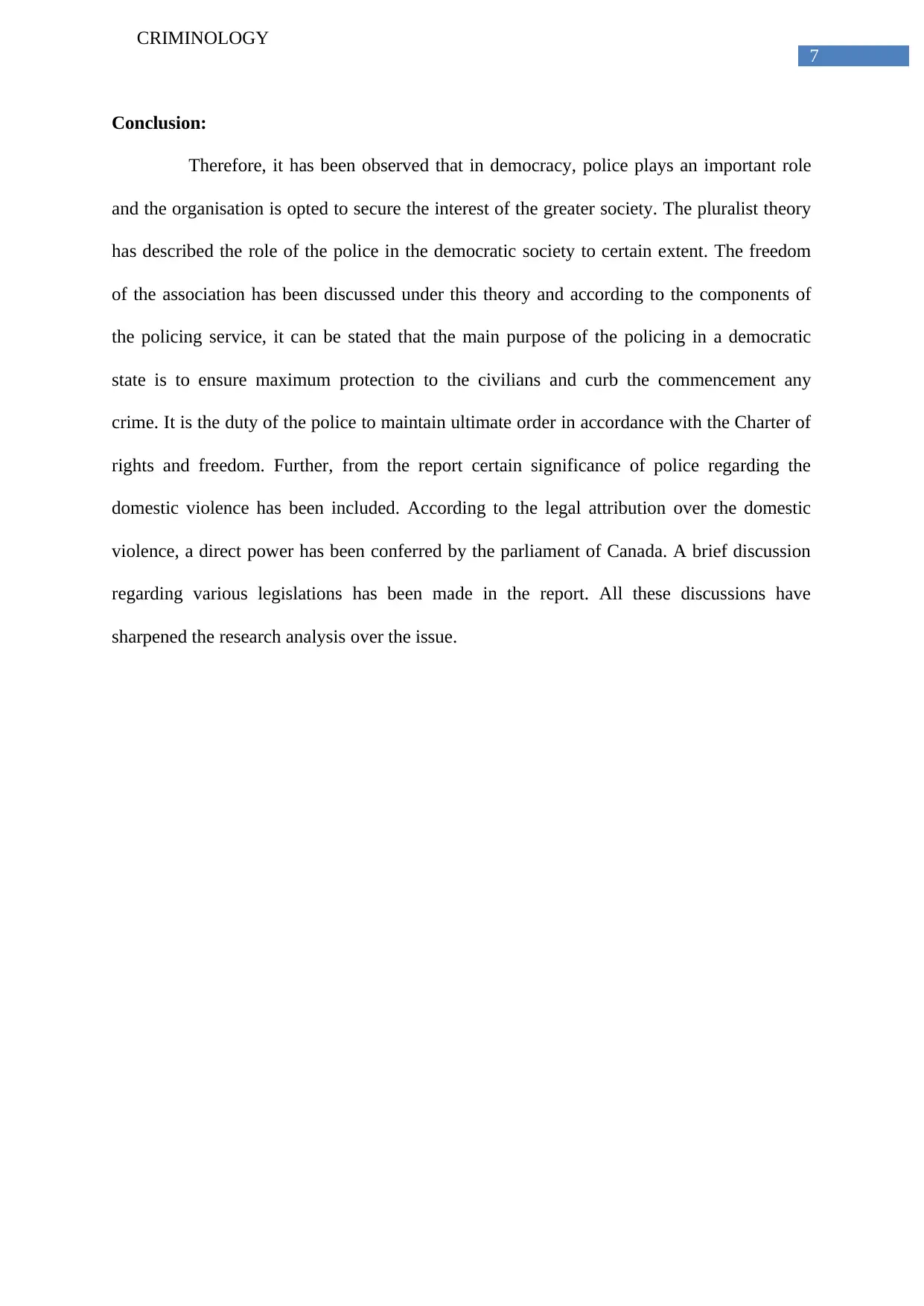
7
CRIMINOLOGY
Conclusion:
Therefore, it has been observed that in democracy, police plays an important role
and the organisation is opted to secure the interest of the greater society. The pluralist theory
has described the role of the police in the democratic society to certain extent. The freedom
of the association has been discussed under this theory and according to the components of
the policing service, it can be stated that the main purpose of the policing in a democratic
state is to ensure maximum protection to the civilians and curb the commencement any
crime. It is the duty of the police to maintain ultimate order in accordance with the Charter of
rights and freedom. Further, from the report certain significance of police regarding the
domestic violence has been included. According to the legal attribution over the domestic
violence, a direct power has been conferred by the parliament of Canada. A brief discussion
regarding various legislations has been made in the report. All these discussions have
sharpened the research analysis over the issue.
CRIMINOLOGY
Conclusion:
Therefore, it has been observed that in democracy, police plays an important role
and the organisation is opted to secure the interest of the greater society. The pluralist theory
has described the role of the police in the democratic society to certain extent. The freedom
of the association has been discussed under this theory and according to the components of
the policing service, it can be stated that the main purpose of the policing in a democratic
state is to ensure maximum protection to the civilians and curb the commencement any
crime. It is the duty of the police to maintain ultimate order in accordance with the Charter of
rights and freedom. Further, from the report certain significance of police regarding the
domestic violence has been included. According to the legal attribution over the domestic
violence, a direct power has been conferred by the parliament of Canada. A brief discussion
regarding various legislations has been made in the report. All these discussions have
sharpened the research analysis over the issue.
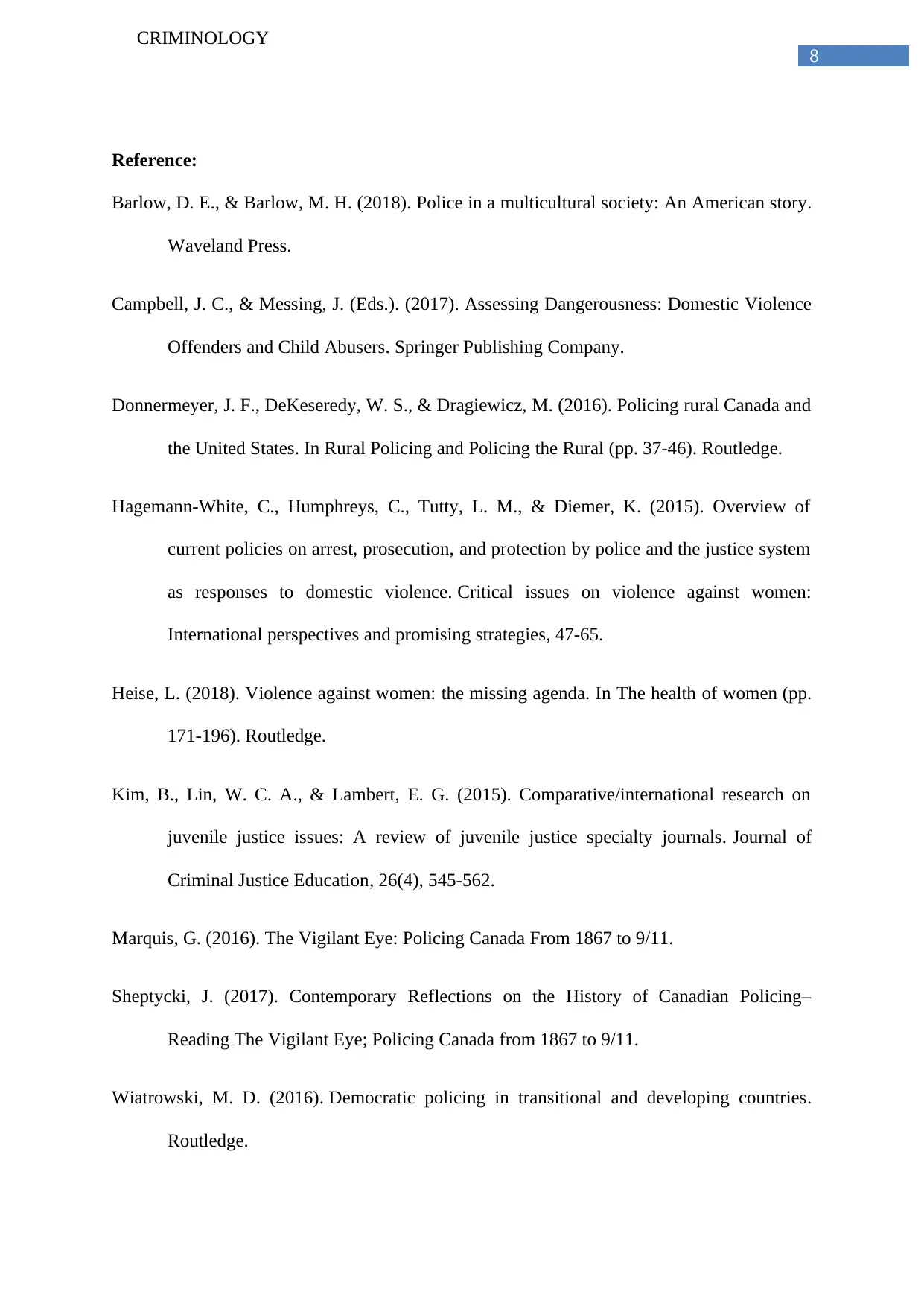
8
CRIMINOLOGY
Reference:
Barlow, D. E., & Barlow, M. H. (2018). Police in a multicultural society: An American story.
Waveland Press.
Campbell, J. C., & Messing, J. (Eds.). (2017). Assessing Dangerousness: Domestic Violence
Offenders and Child Abusers. Springer Publishing Company.
Donnermeyer, J. F., DeKeseredy, W. S., & Dragiewicz, M. (2016). Policing rural Canada and
the United States. In Rural Policing and Policing the Rural (pp. 37-46). Routledge.
Hagemann-White, C., Humphreys, C., Tutty, L. M., & Diemer, K. (2015). Overview of
current policies on arrest, prosecution, and protection by police and the justice system
as responses to domestic violence. Critical issues on violence against women:
International perspectives and promising strategies, 47-65.
Heise, L. (2018). Violence against women: the missing agenda. In The health of women (pp.
171-196). Routledge.
Kim, B., Lin, W. C. A., & Lambert, E. G. (2015). Comparative/international research on
juvenile justice issues: A review of juvenile justice specialty journals. Journal of
Criminal Justice Education, 26(4), 545-562.
Marquis, G. (2016). The Vigilant Eye: Policing Canada From 1867 to 9/11.
Sheptycki, J. (2017). Contemporary Reflections on the History of Canadian Policing–
Reading The Vigilant Eye; Policing Canada from 1867 to 9/11.
Wiatrowski, M. D. (2016). Democratic policing in transitional and developing countries.
Routledge.
CRIMINOLOGY
Reference:
Barlow, D. E., & Barlow, M. H. (2018). Police in a multicultural society: An American story.
Waveland Press.
Campbell, J. C., & Messing, J. (Eds.). (2017). Assessing Dangerousness: Domestic Violence
Offenders and Child Abusers. Springer Publishing Company.
Donnermeyer, J. F., DeKeseredy, W. S., & Dragiewicz, M. (2016). Policing rural Canada and
the United States. In Rural Policing and Policing the Rural (pp. 37-46). Routledge.
Hagemann-White, C., Humphreys, C., Tutty, L. M., & Diemer, K. (2015). Overview of
current policies on arrest, prosecution, and protection by police and the justice system
as responses to domestic violence. Critical issues on violence against women:
International perspectives and promising strategies, 47-65.
Heise, L. (2018). Violence against women: the missing agenda. In The health of women (pp.
171-196). Routledge.
Kim, B., Lin, W. C. A., & Lambert, E. G. (2015). Comparative/international research on
juvenile justice issues: A review of juvenile justice specialty journals. Journal of
Criminal Justice Education, 26(4), 545-562.
Marquis, G. (2016). The Vigilant Eye: Policing Canada From 1867 to 9/11.
Sheptycki, J. (2017). Contemporary Reflections on the History of Canadian Policing–
Reading The Vigilant Eye; Policing Canada from 1867 to 9/11.
Wiatrowski, M. D. (2016). Democratic policing in transitional and developing countries.
Routledge.
⊘ This is a preview!⊘
Do you want full access?
Subscribe today to unlock all pages.

Trusted by 1+ million students worldwide

9
CRIMINOLOGY
CRIMINOLOGY
Paraphrase This Document
Need a fresh take? Get an instant paraphrase of this document with our AI Paraphraser

10
CRIMINOLOGY
CRIMINOLOGY
1 out of 11
Related Documents
Your All-in-One AI-Powered Toolkit for Academic Success.
+13062052269
info@desklib.com
Available 24*7 on WhatsApp / Email
![[object Object]](/_next/static/media/star-bottom.7253800d.svg)
Unlock your academic potential
Copyright © 2020–2026 A2Z Services. All Rights Reserved. Developed and managed by ZUCOL.





